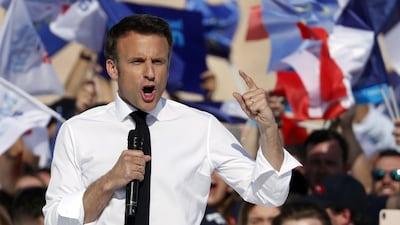Incumbent French President Emmanuel Macron is pinning his hopes of a second term on scooping up votes from his left-wing rival Jean-Luc Melanchon, who was eliminated in the first round of voting.
The centrist leader, 44, will face off with far-right nationalist Marine Le Pen in the second round on Sunday, and polls suggest he is on track to win.
On Friday the race entered the final stretch with candidates conducting their last tours before campaigning ceases at midnight.
Mr Macron and his far-right nationalist rival Marine Le Pen, 53, have tried hard to hoover up votes from Mr Melenchon’s supporters.
Mr Macron is talking up his green credentials, while Ms Le Pen says she will reduce the cost of living.
The Melenchon factor – 7.7 million
Mr Macron is banking on gaining support from the 7.7 million people who previously backed Mr Melenchon.
Of the 10 candidates ruled out of the race in the first ballot held on April 10, Mr Melenchon put up by far the strongest showing with more 7,712,520 people backing him, which accounted for 22 per cent of the overall votes cast.
Mr Macron emerged with 27.85 per cent of the vote, ahead of Ms Le Pen on 23.15 per cent.
Under the French system, a second round is held between the two leading contenders if no single candidate gains an absolute majority of the vote.

Mr Melenchon, 70, told his supporters afterwards that “not one single vote” should go to Ms Le Pen in the second round. However, he stopped short of urging his supporters to get behind Mr Macron’s attempt to secure a second term.
A subsequent survey by Mr Melenchon’s party, La France Insoumise (France Unbowed), suggested that many of his supporters had taken this to mean that they should abstain in the second round.
Macron’s British stronghold – 18,165
Internationally minded French expats are one of Mr Macron’s most loyal groups of supporters and one of the least favourable to Ms Le Pen.
The large number of French people in Britain makes the UK a particular stronghold for the president, who won 18,165 (52.6 per cent) of the votes registered in England in the first round.
Ms Le Pen took a paltry 887 (2.6 per cent), coming seventh behind Mr Macron, Mr Melenchon, far-right rival Eric Zemmour, centre-right Valerie Pecresse, ecologist Yannick Jadot and even unfancied socialist Anne Hidalgo.
The president and his allies have sought to persuade voters that France’s standing in the world is at risk if Ms Le Pen is at the helm of Europe’s second-largest economy.
Ms Le Pen denies wanting to leave the European Union but wants to loosen ties between its members – a view in stark contrast to Mr Macron’s pro-EU sentiments.
Stayed at home – 26.3 per cent
More than a quarter of registered voters, 12.8 million people, did not take part in the first round of the presidential election, while another 800,000 cast a blank or invalid ballot.
These were high abstention rates for a French election and add to uncertainty about predicting the second-round result.
A record low turn-out has been blamed for a shock result before, in 2002, when Ms Le Pen’s father Jean-Marie Le Pen defied expectations to reach the second round against Jacques Chirac.
Some of the eliminated candidates, including Ms Hidalgo and Ms Pecresse, have sought to rally support for Mr Macron in the second round by urging people to keep the far right out of power.
Low unemployment – 7.4 per cent
Mr Macron came to office with an economic reform agenda that ran into trouble when the gilets jaunes, or “yellow vest”, protest movement confronted his policies.
The Covid-19 pandemic also derailed his vision for the country.
But he credits the labour market reforms he managed to push through with reducing unemployment from 9.6 per cent to 7.4 per cent, its lowest level since 2008, and is hoping a recovering economy will help him to victory on Sunday.

Ms Le Pen says workers are being squeezed by the soaring cost of living and opposes the president’s plans to increase the pension age to 65 to reduce the costs of the welfare state.
The president hinted that this could be delayed or watered down in what was seen as an olive branch to left-wing voters.
Le Pen’s Russia problem – €9 million
In one of the most explosive moments of Wednesday’s sole TV debate, Mr Macron highlighted a €9 million ($9.72 million) loan received by Ms Le Pen’s party from a Czech-Russian bank in 2014.
He said that when Ms Le Pen dealt with the Russian leadership, “you’re talking to your banker”.
It followed a series of efforts by Mr Macron’s campaign to use Ms Le Pen’s history of Kremlin-friendly statements against her at a time when Russia is waging war on Ukraine.

Ms Le Pen, who once described Russian President Vladimir Putin and Donald Trump as her main ideological comrades, has sought to distance herself from Moscow since the war broke out and said in the debate that she supported Ukraine.
She also came under fire for her 2017 visit to Moscow to meet Mr Putin before the French presidential run-off that year.
Alexey Navalny, the imprisoned Russian opposition leader, has also voiced his support for Mr Macron’s bid for a second term. Mr Navalny urged French voters to back the centrist and alleged that Ms Le Pen was too closely linked to Russian authorities.
























